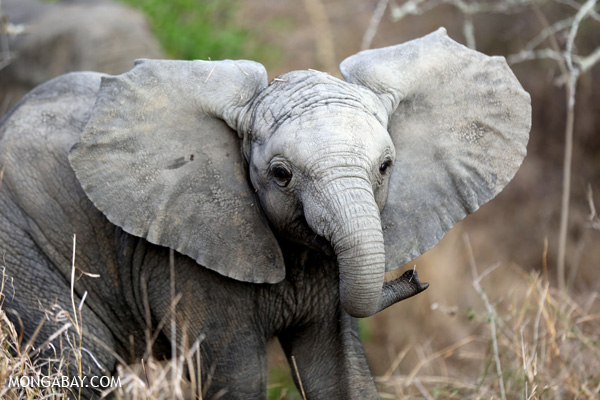
Elephants in Namibia. Photos by Rhett A. Butler.
Marking World Elephant Day, a designation intended to raise awareness about the plight of elephants that are being widely poached for the ivory trade, primatologist Jane Goodall urged people to have greater compassion for Earth’s largest land animals.
“I wake, on this World Elephant Day, thinking of all the elephants I have watched in Africa,” she wrote via email. “It was especially fun to watch when a group went for a bath, splashing in the water, sucking it up and squirting it over their backs, sometimes submerging with just the tips of their trunks showing like periscopes above the water. And I loved seeing them feeding using their trunks like hands to pick leaves overhead, or tear up lush green grass near the water.”
She went on to describe a number of experiences with individual elephants in Tanzania, Uganda and Kenya, including an accidental forest encounter.
“There is another memory – the time when I heard elephants outside the cabin where I was staying and went out to see if I could see them. It was a wooded area, and as I stood, listening, I could hear sticks cracking under elephant feet. Otherwise they made no sound. I bent to peer through the trees, and was just about to put my hand on a grey tree trunk when – just in time – I saw that it was an elephant leg! Fortunately the wind was blowing my scent away from him – or her. I retreated silently back to the cabin, my heart pounding.”

“On another occasion I was with Ian Douglas Hamilton in Manyara National Park, [the] site of his famous study,” she continued. “We found his favorite elephant, Virgo, whom he had known since her birth. And Ian introduced me to her. We got out of the land rover, I held out my hand, and she reached to touch it gently, so gently, with her trunk. Virgo, I shall never forget you.”
But the growing slaughter — estimated at 35,000 elephant a year by the Wildlife Conservation Society, which is leading the “96 Elephants” campaign — fills her with sadness.
“But [now] I’m just thinking with sorrow about the elephants,” she continued. “I wonder how many will be killed, how many tiny calves will lose their mothers [on World Elephant Day]. I cannot write any more because my eyes are blurred with tears.”

However the news was not all bad on World Elephant Day. New York Governor Andrew Cuomo signed a law banning the sale and purchase of most elephant ivory within the state. The move came just a week after New Jersey Governor Chris Christie signed a similar measure.
The United States is one of the world’s largest markets for ivory, making it culpable in the worldwide plunder of wild elephants.
“Today, New York State is taking a stand against a dangerous and cruel industry that is endangering animals across the world,” Governor Cuomo said at the signing. “Restricting the market for ivory articles will help bring an end to the slaughtering of elephants and rhinoceroses and sends a clear message that we will not allow the illegal ivory trade to continue in New York. I urge other states and nations to join us in working to protect these endangered species for generations to come.”
The New York state ban had been pushed by a coalition of conservation groups, including the Wildlife Conservation Society, Natural Resources Defense Council, The Humane Society of the United States, and The Nature Conservancy.
